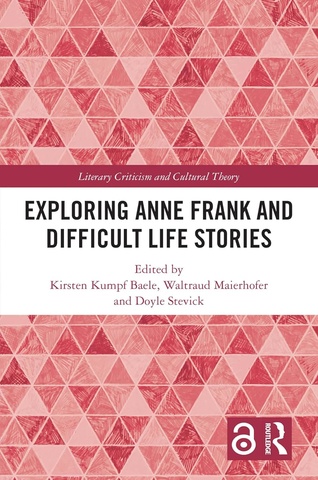
The University of Iowa (UI) Anne Frank Initiative, an International Programs affinity group, hosted a webinar that featured scholars, educators, and writers who read their own literary contributions from the recently published Exploring Anne Frank and Difficult Life Stories (Routledge, 2025) on Friday, April 4, 2025.
The event, introduced by one of the co-editors of the book and UI Professor of German, Waltraud Maierhofer, provided a rich exploration of Anne Frank's story and its relevance to contemporary issues.
“For me, Anne Frank and her diary are a portal to issues involving remembrance of the crimes of the Nazi regime and coming to terms with the past,” Maierhofer said. “This book touches on the issues of persecution and human rights in general today, but also on resilience and hope in what we call in our book difficult life stories.”
Kirsten Kumpf Baele—director of the Anne Frank Initiative, distinguished associate professor of German at Iowa, and co-editor of the book—said its production began in 2022, following the planting of a descendant of Anne Frank’s chestnut tree and the Provost’s Global Forum held that year: Teaching Anne Frank.

“The attendance at the events in 2022 was impressive and it was clear to us this work had even more potential,” Kumpf Baele said. “For this reason, Dr. Maierhofer and I reached out to Dr. Stevick to work on a co-edited volume. All three of us were enthusiastic and believed strongly that this work needed to be shared more widely.”
Doyle Stevick, executive director of the Anne Frank Center at the University of South Carolina, spoke at the webinar about what got him involved in this project.
“In 1999, I found a white supremacist pamphlet thrown in my driveway in Bloomington, Indiana,” Stevick shared. “And it was too late when I discovered that it had been thrown there by my own student. He had enrolled in my Latin class, then failed out of that class.”
“Within six weeks, he decided to try to start a race war, ambushing six men and boys,” Stevick added. “July Fourth weekend, 1999, he went on a shooting spree and shot 11 people. It unsettled everything I thought I understood about education, about bigotry.”
Stevick then shared that these events led him on a journey of trying to understand what it took to overcome such things, which is how he found the Anne Frank House.
“I was struck by two things: First, they didn’t come in telling people what to think, they came to share a story,” Stevick said. “And secondly, they understood the power of young people’s voices. It was Anne Frank’s voice; her story represents the power of young people’s voices.”
Maierhofer added that Anne Frank’s diary is still so appealing today because it’s a reminder of our common humanity.
“During a life of hiding and persecution, Anne Frank was honest in her diary about her fears, but also very hopeful,” Maierhofer said. “She called her diary ‘Kitty’ and addressed it as ‘Dear Kitty.’ It often feels like she’s writing to the reader.”
Kumpf Baele emphasized that readers would grow in historical understanding of the Holocaust and its distinct nature, helping them grasp the gravity of this horrific period in history.
“Our chapters foster awareness and empathy towards global issues,” Kumpf Baele said. “This book will help readers of all generations to connect Anne Frank’s story with other genocides and human rights violations.”
“For educators specifically, the book will offer new ways of teaching Anne Frank and how to make her story relevant for contemporary audiences,” Kumpf Baele added.
Russell Ganim, associate provost and dean of International Programs, discussed how this event underscores the importance of Holocaust education and how it can play a role in tackling other difficult topics from the past and present.
“One of the reasons for this webinar is to promote the work of the Anne Frank Initiative, and the work of this volume,” Ganim said. “It shows that there is active research and scholarship devoted to teaching Anne Frank and making her story known to the world. The hope is that it becomes a teaching tool and that it begets other projects which will continue to move this momentum forward.”
Anne Frank’s legacy continues to bridge the gap between generations and cultures. Exploring Anne Frank and Difficult Stories (Routledge, 2025) demonstrates the timeless impact of Anne Frank’s legacy on today’s society.
“Ultimately, all these wars, moments of conflict, and acts of injustice are human events,” Kumpf Baele said. “We must ask ourselves: ‘How do such events happen?’ ‘Why do they continue without more of us trying to stand up and stop them?’ ‘How do we teach?’”
The webinar was co-sponsored by the Anne Frank Initiative, UI International Programs, the Anne Frank Center at the University of South Carolina, the UI Center for Human Rights, the UI Jewish Studies Network, the UI Pentacrest Museums, the Iowa City UNESCO City of Literature, UI Global Health Studies, the UI College of Public Health, the Magid Center for Writing, the Obermann Center, and Global Ties Iowa.
International Programs (IP) at the University of Iowa (UI) is committed to enriching the global experience of UI students, faculty, staff, and the general public by leading efforts to promote internationally oriented teaching, research, creative work, and community engagement. IP provides support for international students and scholars, administers scholarships and assistance for students who study, intern, or do research abroad, and provides funding opportunities and grant-writing assistance for faculty engaged in international research. IP shares their stories through various media, and by hosting multiple public engagement activities each year.